A Cat Owner's Guide to CBD: Understanding Its Uses and Safety

Cats, beloved companions to many, have long held a special place in our hearts. Their mysterious and independent nature often leaves us wondering about their well-being and how we can ensure they lead happy, healthy lives.
The surge in cannabidiol's popularity isn't limited to humans; it has also extended to our furry friends. So, why the fascination with CBD drops for cats? One reason is that cat owners are increasingly seeking natural alternatives to conventional medications.
They're drawn to hemp's potential[1] to alleviate a wide range of conditions in cats, including pain, anxiety, and aggression, without the unwanted side effects that some prescription drugs may bring.
When considering hemp as an option for your cat's well-being, it's wise to have a conversation with a veterinarian who possesses a good understanding of how CBD pet treats can affect feline health. They can provide valuable insights into the right dosage, potential interactions with other medications, and specific health concerns unique to your cat.
With proper care and attention, CBD for cats might become a meaningful addition to your pet's healthcare routine, elevating their happiness and overall comfort.
Understanding the Potential of CBD for Cats
Cannabidiol is a naturally occurring compound extracted from the hemp plant, a close relative of the marijuana plant. What sets cannabidiol apart from its cannabis counterpart, tetrahydrocannabinol (THC), is its non-psychoactive nature.
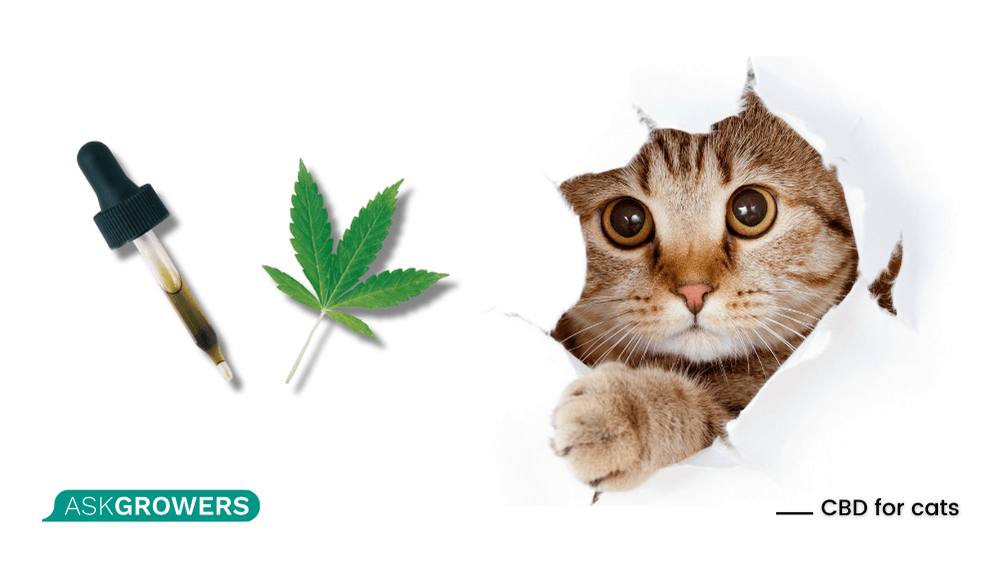
In other words, CBD for cats treats won't induce the "high" commonly associated with cannabis consumption. Instead, it holds the promise of offering a wide array of therapeutic benefits while leaving your cat's mental state unaffected.
The effect of CBD for cats unfolds through its interaction with a fascinating physiological system known as the endocannabinoid system[2] (ECS), which exists not only in cats but in all animals, including humans. The ECS is a complex network of receptors, enzymes, and endocannabinoids (naturally occurring compounds within the body). It plays a vital role in maintaining homeostasis - the body's internal balance.
Cannabidiol's mechanism of action involves binding to specific receptors within the ECS, primarily CB1 and CB2 receptors. These receptors are strategically distributed throughout your cat's body, including the brain, nervous system, and immune cells. When CBD hemp oil for cats engages with these receptors, it triggers a cascade of effects that can help modulate the functions of the ECS, potentially resulting in a myriad of positive outcomes for your feline friend.
But just as with any supplement, the correct CBD dose for cats is crucial when introducing hemp into your pet's diet. Under your veterinarian's guidance, you can determine the appropriate dosage based on factors like your cat's size, age, and the condition being addressed.
Potential Benefits of CBD for Cats
One key aspect of the endocannabinoid system's significance lies in its regulation of essential physiological processes. By interacting with the ECS, cannabidiol holds the potential to influence and improve some aspects of your cat's well-being.
| Condition | CBD for Cats Benefits |
|---|---|
| Pain[3] | CBD oil for cats may offer effective pain relief by reducing inflammation and calming the nervous system. |
Anxiety and Stress[4] |
Cannabidiol's calming influence on the nervous system can help reduce anxiety and stress in cats. CBD for cats' anxiety promotes a sense of tranquility, making it a valuable tool for pets prone to anxiety, especially during stressful events. |
If your cat is dealing with the discomfort of arthritis, cannabidiol's potential to mitigate inflammation offers a holistic approach to feline care. |
|
|
Hemp may stimulate appetite and alleviate nausea, ensuring your cat receives the nourishment necessary for optimal health. |
Besides, cannabidiol plays a really important role when it comes to your pet's muscles. Here are examples of muscle problems in cats that are being explored for their potential alleviation with cannabidiol:
Muscle Strains: Cats, particularly those with active lifestyles or outdoor access, may experience muscle strains due to sudden movements or physical exertion. CBD for cats' pain relief may aid in their recovery.
Muscle Spasms and Tremors: Some cats suffer from muscle spasms or tremors, often due to underlying conditions such as neurological disorders. Cannabidiol's muscle relaxant properties could potentially provide relief from these distressing symptoms.
Injury-Related Muscle Pain: Accidents and injuries can result in muscle pain for cats. Hemp's pain-relieving properties may assist in managing the pain and facilitating the healing process.
Age-Related Muscle Stiffness: As felines age, they may experience muscle stiffness and decreased mobility. CBD for older cats contributes to improved mobility and comfort in senior pets.
As research in this field continues to expand, cannabidiol's role in feline healthcare warrants careful consideration, always under the guidance of a knowledgeable veterinarian. Your cat's health and vitality deserve the best possible care, and hemp may be a valuable tool in achieving that goal.
Choosing the Best Hemp CBD Products for Cats
As you embark on your journey into the world of CBD products for pets, these carefully selected high-quality products provide an excellent starting point. Always consult with your veterinarian to determine the best hemp approach for your cat's specific needs, and prioritize their comfort and well-being.
CBD for Cats: Essential Considerations and Precautions
As we delve into the realm of using cannabidiol as an alternative for our feline companions, it's crucial to emphasize the significance of correct cannabidiol use. Ensuring that your cat's hemp journey is safe and effective hinges on some key factors:
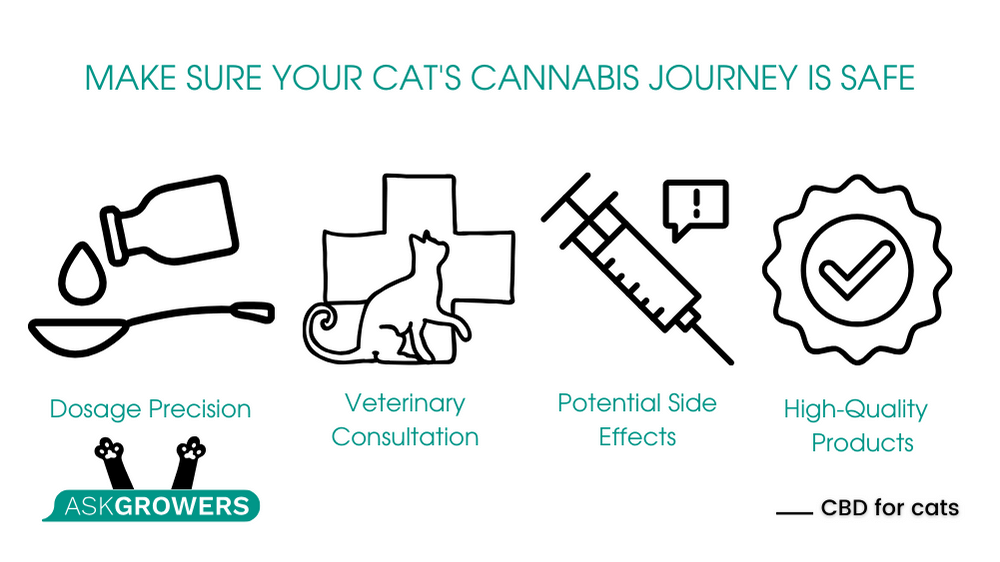
When it comes to introducing CBD chews for cats into your pet's diet, precision is paramount. Cats vary in size, age, and individual needs, making a one-size-fits-all approach inadequate. Avoid guesswork, and always adhere to the recommended dosage for your pet's well-being.
Veterinary Consultation
A conversation with a knowledgeable veterinarian is a must. They possess invaluable insights into your cat's health profile and can provide tailored recommendations. The consultation ensures that vet CBD for cats complements your pet's existing healthcare regimen and doesn't interfere with any ongoing treatments or medications.
High-Quality Cannabidiol Products
Not all hemp products are created equal. Opt for high-quality cannabidiol offerings that are specially formulated for pets. These products should adhere to stringent quality standards, contain minimal THC, and be free from contaminants. The transparency of third-party lab testing ensures the product's purity and potency, offering peace of mind for pet owners.
Potential Side Effects
While hemp is generally well-tolerated by cats, it's essential to be aware of risks. These may include mild drowsiness and dry mouth. Observing your cat's response during the initial phases of cannabidiol introduction allows you to monitor for any adverse reactions. Should you notice anything concerning, promptly consult your veterinarian for guidance.
In essence, the journey of integrating CBD for cats' pain relief into your companion's life is marked by a commitment to responsible usage and vigilant monitoring. It's a pathway to enhancing your pet's overall comfort and quality of life, tailored to their unique needs.
Conclusion
The article underscores the importance of responsible hemp usage for your cat. We've explored the potential benefits, including pain relief and stress reduction.
However, consulting with a veterinarian is essential. They provide expert guidance tailored to your cat's unique needs, ensuring CBD benefits for cats integrate safely with their healthcare routine. We encourage making informed decisions based on scientific research and professional advice.
Your cat's health, happiness, and quality of life remain paramount on this hemp journey, where vigilance and responsible choices are key to their well-being.
Sources
At AskGrowers, our unwavering commitment lies in upholding stringent research standards and guaranteeing the credibility of our materials. Our core principles center on delivering substantive, evidence-based information, refraining from unsupported assertions.
Our primary focus centers on knowledge grounded in robust evidence, acquired through meticulous procedures encompassing peer-reviewed investigations, reputable research institutions, and esteemed expert organizations.
Giorgia della Rocca and Alessandra Di Salvo. "Hemp in Veterinary Medicine: From Feed to Drug." Front. Vet. Sci., 2020. Available at: https://www.ncbi.nlm.nih.gov/pmc/articles/PMC7399642/
Robert J. Silver. "The Endocannabinoid System of Animals." Animals, 2019. Available at: https://www.ncbi.nlm.nih.gov/pmc/articles/PMC6770351/
Agatha Miranda-Cortés, Daniel Mota-Rojas, Nadia Crosignani-Outeda et al. "The role of cannabinoids in pain modulation in companion animals." Front. Vet. Sci., 2023. Available at: https://pubmed.ncbi.nlm.nih.gov/36686189/
Cindy H J Yu, H P Vasantha Rupasinghe. "Cannabidiol-based natural health products for companion animals: Recent advances in the management of anxiety, pain, and inflammation." Research in Veterinary Science, 2021. Available at: https://pubmed.ncbi.nlm.nih.gov/34391060/
Isabella Corsato Alvarenga, Kiran S. Panickar, Hannah Hess, and Stephanie McGrath. "Scientific Validation of Cannabidiol for Management of Dog and Cat Diseases." Annual Review of Animal Biosciences, 2023. Available at: https://www.annualreviews.org/doi/10.1146/annurev-animal-081122-070236
Linda A Parker, Erin M Rock, and Cheryl L Limebeer. "Regulation of nausea and vomiting by cannabinoids." British Journal of Pharmacology, 2010. Available at: https://www.ncbi.nlm.nih.gov/pmc/articles/PMC3165951/
Justyna E Kulpa, Lina J Paulionis, Graham ML Eglit,2 and Dana M Vaughn. "Safety and tolerability of escalating cannabinoid doses in healthy cats." Journal of Feline Medicine and Surgery, 2021. Available at: https://www.ncbi.nlm.nih.gov/pmc/articles/PMC8637357/

 CBD
CBD

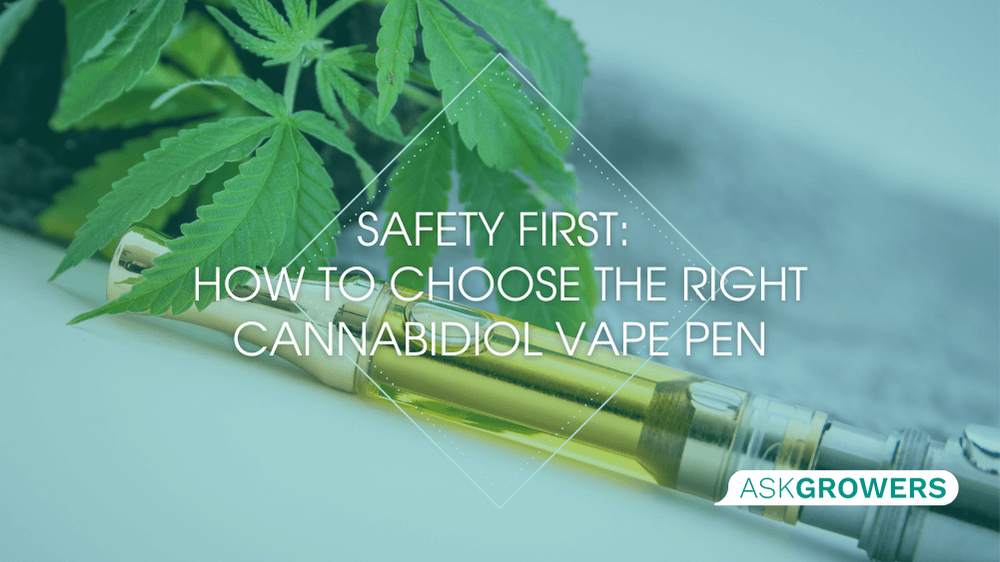

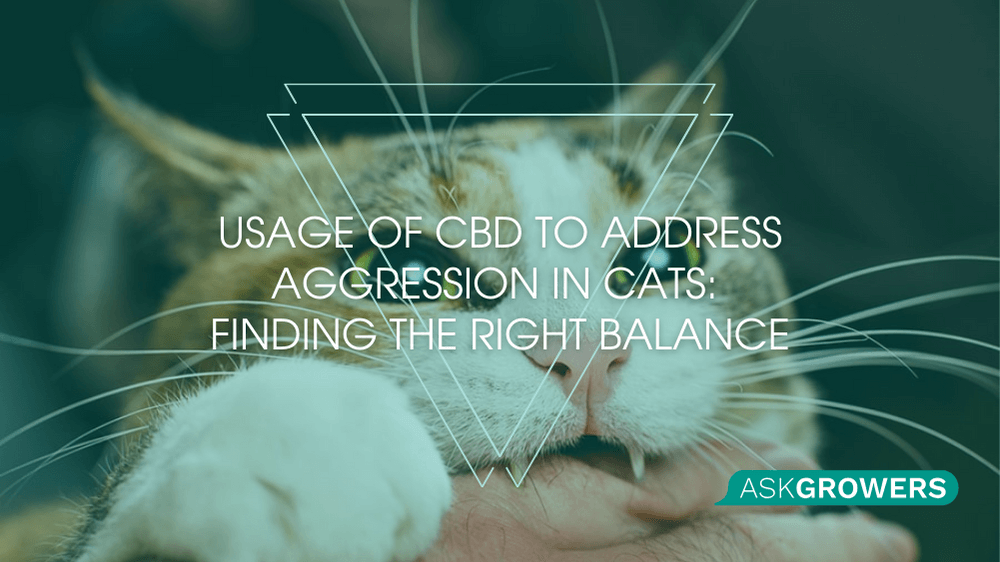
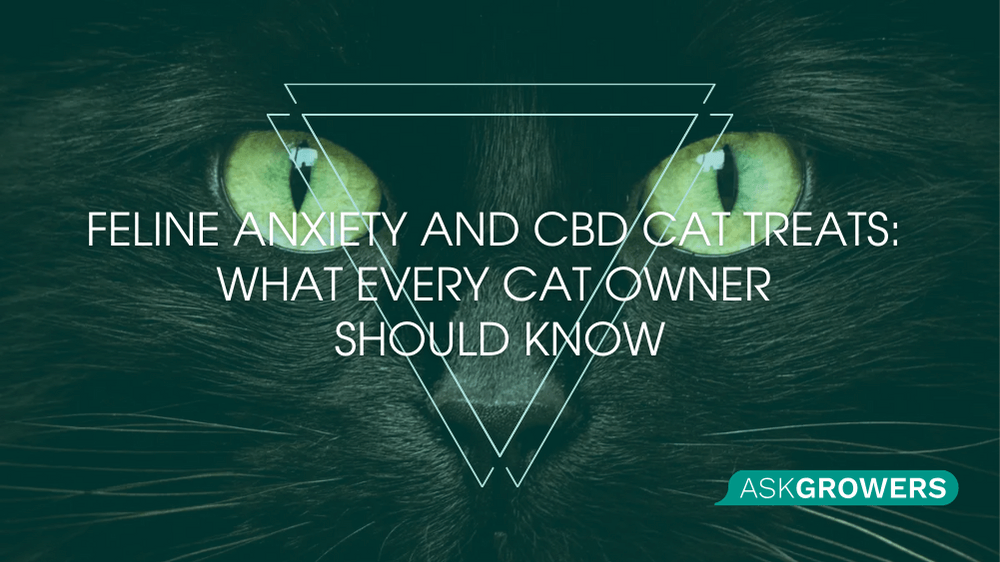


 (1).png)

.jpg)
Be the first and share your opinion
Write a Review